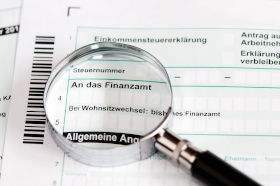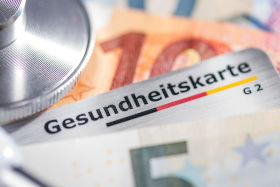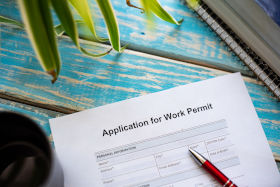
Free business bank accounts
A honest review of Fyrst, Holvi, Kontist, Finom and Wise.
The essentials to run a business, consultancy or freelance as a self-employed in Germany: register, get a tax number, healthcare, invoicing.

You need an officially registered address in Germany. This is done at your local Bürgeramt. The process is called Anmeldung and we explain everything in detail in our How to register an address in Germany article. The Anmeldung only takes 15 minutes but you might have to wait several weeks to get an appointment at the Bürgeramt.
After registering your address, you can get a tax ID from the tax office (Finanzamt), which you need to open a business.
Required documents:
It's important to distinguish between freelancers (Freiberufler) and tradesmen (Gewerbetreibender). The tax office ultimately decides for which of these categories your activity qualifies. This is not necessarily based on your studies or qualifications but based on the tasks you invoice.
This term is reserved for specific professions.
Examples of Freiberufler can be doctors, architects, artists including designers and musicians, engineers, economists, interpreters, midwives, journalists and generally professions that are consulting.
Tradesmen have to pay trade tax (Gewerbesteuer) and some tradesmen have to register in the trade register (Handelsregister).
Examples of Gewerbetreibende are software engineers, craftsmen and generally businesses that produce things including gastronomy.
Skip this step if you are a Freiberufler. You have to do the following if you qualify as a tradesman:
A. Mandatory: fill out a form to officially open your trade. This can be done online in Berlin. Most other cities let you download the form and mail it to them. The recipient address is in the PDF in this case. Please google Gewerbeanmeldung and the name of the nearest city if your location is not on the list.
B. Some tradesmen but not all have to register in the trade register. This is the case if you qualify as Kaufmann. A Kaufmann is somebody who sells goods. The chamber of commerce can help you with this. Tradesmen who don't have a shop or similar where they sell things usually don't have to register in the trade register.
Examples are health permits (Gesundheitszeugnis) from the Gesundheitsamt for opening a cafe or restaurant, and a criminal record for jobs involving children. Contact the IHK for more information.
Your clients in Germany will expect to pay you to a checking account at a German bank although in my experience many clients don't care about sending money to a foreign bank.
Most big German banks offer dedicated business checking accounts which usually cost a monthly fee. Kontist has a free business account. Invoicing to your private account is technically possible but some banks might close your private account if you use it for business. I review free business accounts in this article.
There are two ways how you can do this:
Please note that sending the printed form to the tax office is not accepted anymore.
These are the most common German taxes:
Read more in our article about taxes for self-employed.
The tax declaration is due on the 31st of July each year and is mandatory once you sign up with the tax office. The deadline for the tax declaration is the 31st of December if you work together with a tax consultant.
You must inform your health insurer about your freelance plans. The public health insurers make a difference between Hauptberuflich selbständig (full-time freelancer) and Nebenberuflich selbständig (part-time freelancer). The latter means that you keep your main job as an employee but freelance on the side.
You have to pay all of the health insurance yourself if freelancing is your main occupation. In this case, private health insurance can be cheaper. You do not have to pay contributions to public health insurance if your freelancing activity is not more than 20 hours a week and is not your main income. Please contact your health insurer for more details.
These are the mandatory fields every invoice in Germany must have:
Only add a VAT ID and VAT amount to invoices if you qualify for Value Added Tax (Umsatzsteuer). An error I often see on invoices from freelancers is that they charge Value Added Tax without being qualified for this. You only need to charge VAT if you earn more than 22.000.- Euro per year two years in a row.
You can apply at the tax office to be eligible for VAT if you want to hide from your clients that you are a small business or if you want to get the VAT back from your initial investments.
The easiest way to write a compliant invoice is by using an online invoicing service like Free Invoice Builder.
Collect all invoices in print or digitally for any business-related expenditure like a computer or other office hardware, travel etc and store them together with your monthly account statements. I recommend doing this at the end of each month so you have it ready when it is time to hand in the tax declaration.
We have a list of the best tax return software and services here.

A honest review of Fyrst, Holvi, Kontist, Finom and Wise.
Find an English speaking tax consultant close to your address.

The fastest way to do your taxes in Germany without speaking German. A review of Wiso, Smartsteuer, Wundertax, Sorted.

Introduction into taxes in Germany for consultants, freelancers and other self-employed. This article gives you an overview of the most important types of taxes.

An overview of the different types of work visas in Germany. A starter guide for everybody who wants to work in Germany.

What is the procedure when visiting a doctor or a hospital in Germany? How long do I have to wait for appointments? What is the quality of the treatment? What are the cos...

The best German bank accounts in 2024 for expats. A honest review of N26, DKB, 1822direkt, bunq, ING-DiBa and many more.

The German Blue Card visa is an option for a permanent residence permit if you are looking to work in mathematics, IT, natural sciences, engineering or human medicine or ...

An independent 2024 review of the best German public and private health insurance plans for singles, couples and families including expat health insurance for visa applic...

How to dial a phone number in Germany.

The best German mobile phone and prepaid plans for expats. A review of Smartmobil, Telekom, Vodafone, Lebara, fraenk.

Public vs private health insurance in Germany for foreigners. Your options and why cheap plans might turn out to be more expensive in the end.

What to pay attention for when applying for private health insurance in Germany.

A guide to getting a German work visa for employees. This visa allows you to work and live in Germany.

Get your money back if you have to cancel your trip because of Corona.

This guide walks you through the all the necessary steps to remotely find a job in Germany, including an overview of the most important job search engines and common appl...

Freelance artists or publishers in Germany are entitled to cheaper healthcare plans via the Künstlersozialkasse (KSK). A step by step guide.

A review of the most useful health apps in Germany.

A step by step guide to get a visa to freelance in Germany.
You can't do all the work at home anymore and need help? Follow this step by step guide to get help covered by your German health insurance.
A step by step guide to find a doctor which speaks your language in Germany based on your ZIP code.

A step by step guide to get your money back if an airline cancelled a flight but does not refund the money.

A honest review of German internet providers and how the pick the best one for your location (and save money).

A step by step guide to register an address in Germany. This is called Anmeldung an necessary to get a tax id, open a bank account or to sign up for health insurance.

All about the German student visa, the application process and required documents.

A guide to find the best electricity company in Germany, including comparison websites, and companies with English support.

Our guide shows you the necessary steps to open a bank account as a foreigner in Germany.

An introduction into the German tax system for employees.

83% of German households have a private liability insurance. Get protection for as little as 43.- Euro per year. A review for expats including dog liability.

A bureaucratic nightmare with a happy end.

A checklist of steps to do after you found a flat: registration, electricity and internet providers, moving services, useful insurances and warnings of possible scams.